Ukraine is paying a terrible price for its resistance to Russia's genocide war and occupation. On the night of 8 November, all of Ukraine came under fire. The Russian army launched over 450 attack drones and 45 missiles, targeting residential buildings and energy infrastructure across the country.
According to Centrenergo, a company supplying electricity to central and eastern Ukraine, its three thermal power plants have been forced to shut down following the attacks. Eight regions are facing widespread power outages, and in Kyiv, residents are left without electricity for up to 12 hours a day.
In Dnipro, a drone strike on a residential building killed three people.
“More pressure on Moscow”: Zelenskyy calls for stronger sanctions
President Volodymyr Zelenskyy said the attacks must trigger a unified global sanctions response.
“Every strike by Moscow on our energy sector must be met with sanctions on the entire Russian energy sector, without exception. Nuclear energy, the military-industrial complex, and trade in oil and gas must all be under sanctions," Zelenskyy claimed.
He emphasized that the world must act on frozen Russian assets and increase support for Ukraine to prevent the Kremlin from destroying the country’s civilian energy system before winter.
25 ballistic and seven hypersonic missiles
According to Air Force spokesperson Yurii Ihnat, Russia used a record number of ballistic missiles in this latest strike, per 24 Channel.
“Twenty-five Iskander-M/KN-23s and seven Kinzhal missiles. A total of 32 missiles followed ballistic trajectories. This is Russia's new tactic," he said.
The main strikes hit the regions of Kharkiv, Kyiv, Poltava, Dnipro, Kirovohrad, Mykolaiv, Sumy, Chernihiv, and Odesa.
Largest national oil and gas company says Russia wants to freeze Ukrainians
Naftogaz CEO Serhii Koretskyi said the 8 November strike was the ninth deliberate attack on civilian gas infrastructure since early October.
“This is yet another act of terrorism aimed at depriving Ukrainians of gas, heat, and electricity during the winter," said the head of the the largest national oil and gas company of Ukraine.
Ukraine strengthens energy ties with the West
On the eve of the strikes, Ukraine signed an agreement to import US liquefied natural gas (LNG) via Greek terminals. According to the Ministry of Energy, the deal represents a long-term partnership through 2050, ensuring stable gas supplies and integrating Ukraine into European energy routes.
“We are building a resilient system for the delivery and storage of American gas to prevent Moscow’s energy blackmail,” said Energy Minister Svitlana Hrynchuk.
Russia’s deadly winter offensive tests the world
The Kremlin is now operating even more clinically and cynically than before. Russian capabilities and tactics are evolving faster than Ukraine can improve its air defenses, both missile interceptions and electronic warfare measures around sensitive sites. It appears this winter will be a test of endurance like no other.
The Kremlin has changed the way it is terrorizing Ukrainians when temperatures are going low, by concentrating on specific regions, striking in waves, and using new variants of cheap Shahed drones.
The drones are also attacking differently, approaching from near‑vertical trajectories and flying above the effective range of machine guns, almost like missiles.
Beyond the cost of damaged infrastructure, recent attacks are forcing Ukraine to spend a staggering $1.9 billion on imported gas.
Experts warn that this winter could be one of the toughest in Ukraine’s history. The world’s response will determine whether the aggressor can be contained or whether the global community allows the destruction of sovereign nations by force.
Follow Euromaidan Press on Google News! YOUR SUPPORT = OUR VOICE
